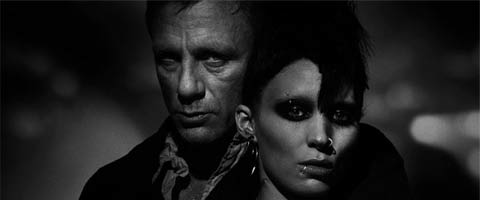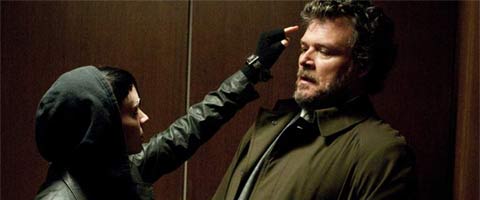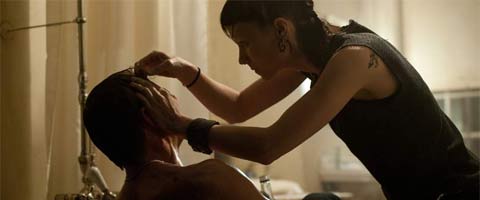The Five Most Common Misconceptions About David Fincher's The Girl With The Dragon Tattoo

Your Daily Blend of Entertainment News
You are now subscribed
Your newsletter sign-up was successful
I believe that conversation and discourse in the movie world is just as important as individual opinion. While I may not be able to convince you that a film is amazing and you might not be able to convince me that a film is crap, reasoning and passion is always appreciated around Cinema Blend. It’s for that reason that I spend a good deal of time reading comments and thoughts left by users here, on our Facebook page, and on Twitter.
Over the past few months, however, I’ve noticed something slightly unnerving. Whenever we posted a new article about David Fincher’s The Girl With The Dragon Tattoo, I would see a number of comments bashing the movie sight unseen, largely linking it back to the Swedish film from 2009. It’s totally fine and understandable not to be interested in a film (I come across titles like that on a daily basis), what’s not okay is to form opinions based on misconceptions. So I’m here to set the record straight.
Below you will find a full breakdown of the five most common pieces of misinformation floating around about The Girl With The Dragon Tattoo and my reasons for why they are completely off-base. Check it out.

"The Story Has Been Americanized"
I’ve seen people make this claim in multiple places, but the truth is that the people saying it either a) haven’t done any research about the film or b) don’t know what the word “Americanized” means. I assume that the folks in the latter category believe that the word means “in English,” but, believe it or not, America isn’t the only country where English is the first language (shocking, I know). The truth is that director David Fincher and writer Steven Zaillian actually did the opposite of Americanization. The story is still set in Sweden, all of the actors are portraying Swedish characters with Swedish accents, and the movie was actually filmed IN SWEDEN. The filmmakers could have easily decided to set the movie in Boston, Detroit, or any other cold environment, but they made decision not to. The Girl With The Dragon Tattoo is everything but Americanized.

"It’s A Remake"
Just like the last section, this comes down to a matter of definition. By calling the movie a remake, people are making the assumption that Fincher and Zaillian completely based their movie on the 2009 film from director Niels Arden Oplev. This is simply not the truth. The source behind the new movie is the novel by Stieg Larsson and that’s all. It’s not a remake, but rather an English-language adaptation of material that has previously been turned into a motion picture. That’s not the same thing. In fact, the Fincher film actually makes some major variations in the story, which not only distances it from the Swedish film, but the book as well. Fincher’s newest work has plenty to offer, even for those that think that the 2009 adaptation is the greatest thing since sliced bread.
Your Daily Blend of Entertainment News

"There’s No Way That Rooney Mara Can Play Lisbeth Salander As Well As Noomi Rapace"
This one is a bit trickier, as the judgment of a performance is based on opinion rather than pure fact like the first two entries on the list, but do you know what doesn’t hurt? Universal praise. Since the embargo for reviews of The Girl With The Dragon Tattoo lifted last Tuesday, film critics have been lauding Mara’s turn as goth hacker Lisbeth Salander, as she steals every scene and plays the part to perfect. This isn’t to knock the performance by Noomi Rapace, who also earned more than her fair share of applause, but to dismiss Mara sight unseen is preposterous. If you want to make that claim, go see the English-adaptation and then decide for yourself if Mara is up to snuff. Personally, as I said in my review, I think Mara actually surpasses Rapace’s performance.

"I Won’t Understand The Movie If I Haven’t Read The Book"
Yes, I have heard this from some people and hopefully there are more than a few of you who realize how absurd it is. Admittedly Stieg Larsson’s novel is quite dense, both in the sense that it has a complex mystery and is nearly 600 pages long, but it’s the job of a good screenwriter to make the material accessible to a wide audience and that’s exactly what Steven Zaillian has done. But this concept is idiotic on its most base level. Every year we get hundreds if not thousands of movies that have been adapted from books and practically none of them are impossible to understand without having read the source material first (and the only reason I say “practically” is because there are some really shitty screenwriters out there). Just because you haven’t ready the first book in Larsson’s Millennium trilogy doesn’t mean you won’t understand The Girl With The Dragon Tattoo.

"Hollywood Probably Reduced The Graphic Content Because Americans Can’t Stomach It"
When I’ve read this comment online I’ve been forced to stifle a laugh, but you won’t understand why it’s so funny until you’ve seen the movie. The truth is that David Fincher’s adaptation may actually be darker than the Swedish film from two years ago. The sex and violence in The Girl With The Dragon Tattoo is startlingly graphic and, in the case of some scenes, actually more intense than the Niels Arden Oplev version. Even more powerful, though, is the unrelenting atmosphere that the film holds, preventing the audience from ever falling out of the movie. The overall idea of this patently ridiculous if not simply because David Fincher has proven over the course of his 19-year film career that he will never pull his punches. America may have been created as a puritanical state, but that history in no way affects The Girl With The Dragon Tattoo.

Eric Eisenberg is the Assistant Managing Editor at CinemaBlend. After graduating Boston University and earning a bachelor’s degree in journalism, he took a part-time job as a staff writer for CinemaBlend, and after six months was offered the opportunity to move to Los Angeles and take on a newly created West Coast Editor position. Over a decade later, he's continuing to advance his interests and expertise. In addition to conducting filmmaker interviews and contributing to the news and feature content of the site, Eric also oversees the Movie Reviews section, writes the the weekend box office report (published Sundays), and is the site's resident Stephen King expert. He has two King-related columns.
